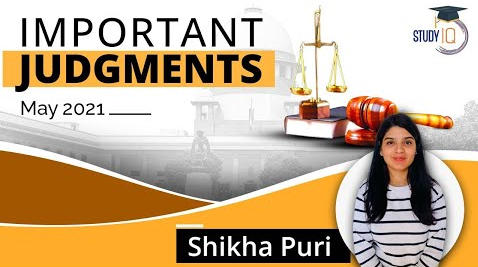Table of Contents
Achhar Singh vs. State of Himachal Pradesh
Supreme Court
CORUM
CJI NV Ramana, Justices Surya Kant and Aniruddha Bose
OBSERVATION
- The Supreme Court observed that evidence given by a witness can not be discarded as a whole on the ground that it is exaggerated.
- “To make a mountain out of a molehill, the molehill shall have to exist primarily. A Court of law, being mindful of such distinction is duty bound to disseminate ‘truth’ from ‘falsehood’
Rajkumar Sabu Vs. Sabu Trade Private Limited
Supreme Court
CORUM
Justice Aniruddha Bose
OBSERVATION
- A criminal case cannot be transferred under Section 406 CrPC merely because the party does not understand the language of the Court which has jurisdiction to hear the case, the Supreme Court held.
- Convenience of one of the parties cannot be a ground for allowing his transfer application.
Satbir Singh Vs. State Of Haryana
Supreme Court
CORUM
CJI NV Ramana, Justice Aniruddha Bose
OBSERVATION
- The bench observed that the examination of an accused under Section 313, CrPC cannot be treated as a mere procedural formality, as it based on the fundamental principle of fairness.
- It imposes an obligation on the court to question the accused fairly, with care and caution, the court said.
- Re: Contagion of Covid in Children protection Homes
Supreme Court
CORUM
Justice Nageswara Rao and Justice Aniruddha Bose
OBSERVATION
- The Supreme Court directed the district authorities to immediately upload information of children who have become orphans after March 2020, and immediately take charge of such children and attend to their basic needs without waiting for any further orders of this court.
Dharmendra Kumar v State of NCT of Delhi
Delhi High Court
OBSERVATION
- A single judge bench of the Delhi High Court today directed that “no authority shall stop any advocate in the NCT of Delhi” from movement during the curfew period without an e-pass, “if he/she produces a valid identity card” proving that he/she is an advocate.
- The Delhi High Court has ordered that strict action would be taken against officers who restrict movement of advocates during the ongoing curfew for want of e-pass.
- State of Uttar Pradesh versus In Re Inhuman Condition at Quarantine Centres and for Providing Better Treatment to Corona Positive
Supreme Court CORUM
Justices Vineet Saran and BR Gavai
OBSERVATION
- Acknowledging the effort of the HC for looking into the matter in depth while passing the order, we state that the Court should avoid passing orders if they are impossible to be implemented. The doctrine of impossibility is equally applicable to the Courts”, the bench said.
- The Allahabad High Court, while considering a suo moto case taken to deal with COVID issues, had passed a slew of directions on May 17.
MST. X (THROUGH MOTHER AND NATURAL GUARDIAN) versus STATE & ORS.
Delhi High Court
CORUM
Justice Anup J. Bhambhani
OBSERVATION
- The court while awarding ₹6 lakh as interim compensation to a minor victim of sexual assault, remarked,
- “Since the system cannot turn the clock back nor ‘undo’ the offence, there is little else the court can do other than prosecute the offender and provide to the victim whatever psychological security and sense of the empowerment that monetary compensation can give.“
- The Bench directed the Delhi State Legal Services Authority to disburse and pay interim compensation.
NOTIFICATION
- A legal practitioner with seven years experience who is ‘a person with benchmark disability’ can make an application for appointment as a notary.
- The Centre notified Notaries (Amendment) Rules, 2021 which inserts the following clause in Rule 3 of Notaries Rules, 1956.
The following are the qualifications required for appointment as a notary:
- A person had been practicing at least for ten years,
- A person belonging to Scheduled Caste/Scheduled Tribes and other backward classes had been practicing at least for seven years
- A woman who had been practicing at least for seven years, as a legal practitioner, or
- He had been a member of the Indian Legal Services under the Central Government,
- He had been at least for ten years,-
(i) a member of Judicial Service (ii) held an office under the Central Government or a State Government requiring special knowledge of law after enrolment as an advocate (iii) held an office in the department of Judge Advocate General or in the legal department of the armed forces.
Download | Free PDF






















 WhatsApp
WhatsApp